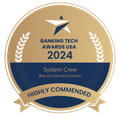Hybrid Cloud Model
Our hybrid cloud model combines data centers in Germany, Switzerland, and/or the USA with Microsoft Cloud and Citrix Cloud. This offers a secure and efficient IT infrastructure tailored to our clients' needs.
Our private cloud ensures control, privacy, and compliance with data protection laws, ideal for finance industry applications. Partnering with Microsoft, we leverage Azure, Microsoft 365, and Dynamics 365 for advanced, scalable cloud services. This balanced approach provides the security of a private cloud with the scalability of public cloud services.


